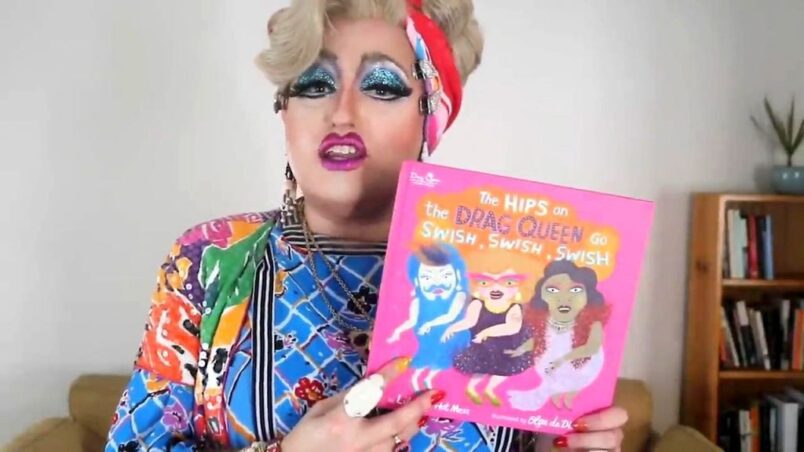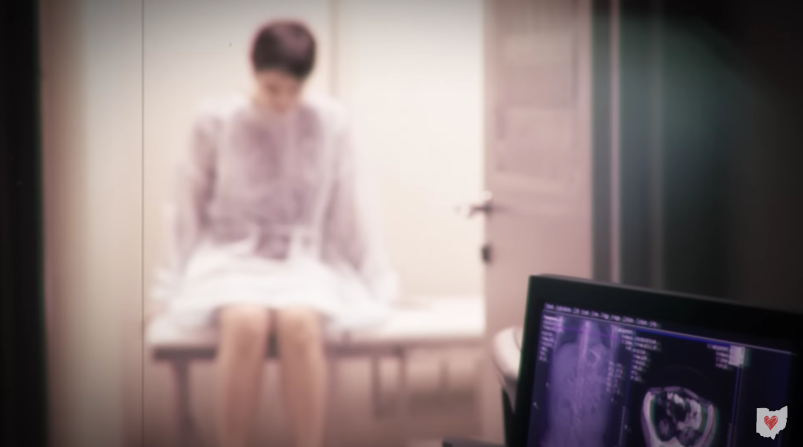Lil Miss Hot Mess, a prominent drag queen, realized about a week ago that she had been pulled into a fight over abortion in Ohio, which is over a thousand miles from her current home. The news came via a message from a friend, who tipped Lil Miss Hot Mess off that she was starring in an ad paid for by the group Protect Women Ohio. The commercial warned an upcoming ballot measure, “State Issue 1,” would allow “out-of-state special interest groups” to “enshrine late-term abortion in our constitution and abolish parental rights so someone can take your child to get an abortion or sex change operation without your consent.” Along with this ominous message, the ad featured footage of Lil Miss Hot Mess participating in a “Drag Story Hour” event alongside images of happy families with prepubescent children.
According to Lil MIss Hot Mess, her reaction to the intensely dramatic commercial was, “honestly, an eyeroll.”
Other people might be shocked to find their image in a television ad running in a state where they don’t live, focused on an issue they have never weighed in on. But, as a prominent drag queen, Lil Miss Hot Mess has become used to political attacks of late. Even so, this new use of her image was different. The attack ad featuring Lil Miss Hot Mess was part of a political battle that was not directly related to drag or LGBTQ issues. Instead, it was a salvo in a multimillion dollar offensive that critics have described as a “disinformation campaign” for its strained attempts to harness right-wing hysteria surrounding the raging culture wars over gender and sexuality to defeat an abortion measure in Ohio.
Lil Miss Hot Mess is a board member of “Drag Story Hour,” a program that stages events where drag performers read to children in an effort to entertain and give them “glamorous, positive, and unabashedly queer role models.” Though the organization has promoted readings since 2015, in more recent years the events have become a lightning rod amid rising threats and violence against the LGBTQ community. Drag Story Hour has been the focus of protests by neo-Nazi groups and a key inspiration for a wave of legislation in at least fourteen states seeking to limit drag performances. Lil Miss Hot Mess told TPM she has personally dealt with threats and protests — and the use of her image in political attacks.
“It’s not the first time that they’ve used — they being the right kind of broadly — have used footage of me and other Drag Story events for various types of political advertisements. Marco Rubio used some imagery of me last fall,” explained Lil Miss Hot Mess, who said she has consulted attorneys about potential legal action related to the use of her image.
The Ohio campaign takes it a step further. Unlike Rubio’s ad, the Protect Women Ohio commercial isn’t a direct shot in the far-right’s manufactured culture war over sexuality, gender, and children’s education. Instead, it’s a convoluted attempt to bring right wing anger over drag into a fight over the democratic process and reproductive rights in the Buckeye State.
State Issue 1, which Ohioans will vote on in a special election on Aug. 8, is not explicitly about abortion. The ballot measure pushed by Republicans in the state legislature would make it more difficult to amend Ohio’s constitution with ballot initiatives in the future. Currently, these changes can come up for a vote if backers obtain enough signatures to equal five percent of the votes cast in half of the state’s counties in the most recent gubernatorial election. Once an initiative is on the ballot, it can pass with a simple majority. State Issue 1 seeks to change that by making tougher requirements for how these signatures are obtained and by raising the threshold for how ballot measures are passed to 60 percent.
“I did have to look up what Issue 1 was and, when I did, I was surprised that this was the tactic they were taking,” Lil Miss Hot Mess said. “It became clear to me reading about Issue 1 just what a kind of anti-democratic power grab it is in general, but I think for them to be framing it in terms of these questions of gender, like it’s just so far from the reality of what this legislation actually does. It’s just like misleading, upon misleading, upon misleading.”
Along with being confusing, Lil Miss Hot Mess suggested that drumming up false fears about the LGBTQ community during a rising tide of hate crimes could be dangerous.
“They are 100 percent inciting violence,” she said of the commercial.

Protect Women Ohio, which is a coalition of conservative and anti-abortion groups, defended its ad featuring Lil Miss Hot Mess in a statement to TPM. The group’s press secretary, Amy Natoce, suggested interest groups, namely the American Civil Liberties Union, theoretically could use a ballot initiative to change laws regarding gender-affirming care.
“The fact that Lil Miss Hot Mess objects to Issue 1 demonstrates exactly why Ohio needs to enact stronger constitutional protections and preserve parental rights,” Natoce wrote in an email. ”Issue 1 will protect Ohio’s constitution from out-of-state special interest groups – like the ACLU – that try to circumvent the legislature and buy their way into the constitution. The ACLU has a long and well-documented history of attacking parental rights, pushing trans ideology in classrooms, and encouraging sex changes for kids.”
To prove her point, Natoce linked to a page on her own group’s website and a pair of pages from the ACLU’s site that made far more nuanced points than her characterizations. One criticized recent school book bans that have targeted literature with LGBT themes. The other that criticized laws that would prevent gender affirming care.
While the fight over Issue 1 could, in the future, affect ballot referenda on a wide range of topics, the effort to make it harder for citizens to change laws in Ohio has come in the shadow of an effort to protect reproductive rights in the state. The Supreme Court decision that overturned Roe v. Wade last year opened the door for the enforcement of a separate Ohio law that could ban abortions in the state as early as six weeks into a pregnancy. That law has been temporarily blocked in court. In the meantime, as in other states, pro-abortion rights activists in Ohio have responded to the Supreme Court ruling by seeking to enshrine abortion rights at the state level by passing a constitutional amendment via ballot initiative.
Last month, the groups behind the constitutional amendment effort announced they had obtained the necessary signatures and the secretary of state confirmed the amendment qualified to go on the ballot in November. The special election vote over Issue 1 will now determine how much support the amendment will need to pass, sixty percent or a simple majority. Some supporters of Issue 1 have explicitly admitted it was designed as a hurdle to block this push to protect abortion rights in the state constitution.
Protect Women Ohio, which aired the ad tying Issue 1 to Drag Story Hour and transgender issues was established to fight the abortion amendment. And even when the fight was simply about abortion, the group sought to bring sexuality and gender into the conversation.
An earlier commercial from the group told a dramatic and fairly far fetched story of a young girl pressured by the internet to become a man and to abort a pregnancy.
“Your daughter’s young, vulnerable, online. You fear the worst: pushed to change her sex or to get an abortion,” a narrator declared in the clip.
That commercial was part of a $5 million ad buy that has been criticized by both abortion advocates and non-partisan experts as deceptive. Dr. Lauren Beene, Executive Director of Ohio Physicians For Reproductive Rights, which is one of the pro-choice groups backing the amendment, responded to the commercial with a statement calling it “demonstrably and totally false.”
“There is absolutely nothing in the amendment that mentions or supersedes Ohio’s parental consent laws,” Beene said. “Their intentionally deceptive ad is the beginning of a multi-million-dollar disinformation campaign designed to raise unsubstantiated fears and distract from the fact that the amendment will ensure Ohioans have access to comprehensive reproductive health care, including abortion, and preserve the sanctity of the doctor-patient relationship.”
Protect Women Ohio’s commercial was also fact checked by Ohio Capital Journal, an independent news organization, which described it as “false.”
“Ohio’s abortion amendment says nothing about transgender or parental rights, contrary to the anti-abortion ad’s unfounded claims,” statehouse reporter Morgan Trau wrote in her report.
Trau pressed a member of the coalition behind Protect Ohio Women about the discrepancy and he asked to “take a break from the interview to chat without being recorded.” While Natoce, the group’s press secretary, defended their efforts to link Issue 1 to “sex change” procedures to TPM she did not respond to criticism that its prior ads about the abortion amendment falsely conflated the issues.
Election after election since the Dobbs ruling has demonstrated the energizing power of abortion across party lines and the unpopularity of extreme abortion restrictions — including in purple and even red states. A ballot measure in Kansas last year that would’ve allowed the state’s Republican-controlled legislature to pass new restrictions and even outright ban abortion there was overwhelmingly rejected by voters. The proposed amendment was shot down in part due to an uptick in turnout from Democrats and independents. But post-election polling shows Republican voters had a hand in its defeat as well. In more than a dozen Kansas counties that Trump won in 2020, majorities rejected the measure. A similar scenario played out in Michigan last fall when voters approved a measure that enshrined reproductive rights into the state constitution.
The unpopularity of abortion restrictions post-Dobbs has been tripping up Republicans for more than a year as the party struggles to find its footing. Republicans’ broader flailing on the issue has shown up most dramatically among 2024 GOP candidates who are largely refusing to offer up specifics on where they stand on a national ban — wary of alienating this increasingly empowered subset of GOP voters who are generally pro-life but opposed to the extreme restrictions being passed in red states across the country.
Scott Goodstein, the founder of the political consulting firm Catalyst Campaigns, who has advised Ohio Physicians For Reproductive Rights and another pro-abortion rights group in the state, Protect Choice Ohio, said right wing groups are trying to falsely raise the specter of shadowy interests “turning your kids gay” due to the surveys that show the majority of voters in the state and nationally support abortion rights.
“The right wing knows that the average Republican is not where the far right is on abortion, and so, if abortion is not a winning issue, they’re conflating a bunch of issues and adding confusion … that has nothing to do with the Ohio ballot initiative,” Goodstein said in a conversation with TPM.
Goodstein described Protect Women Ohio’s ads as “a disinformation campaign.”
“This is the trifecta, it’s got everything; conflating the issues, stoking fears, and suppressing voters,” he said.







I was wondering about that.
The anti-abortion champions will be in for a surprise when they find out drag queens can’t get pregnant. Not a subject in the evangelical science classes.
They’re also going to find out that abortion rights & drag queens are way more popular than their theocratic messaging.
Liars. Liars. Liars. Talk about bad faith actors. This is how the right wing always does it–remove the nuance, obscure what’s really going on, stoke people’s fears about a really unlikely outcome.
In Rubio’s defense, he was using Lil Miss Hot Mess’s imagery in the privacy of his own bathroom.